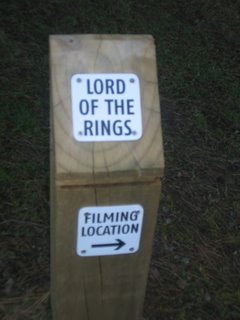Tangi, Part 2
On Tuesday morning, Candida (the British girl who was my foreigner buddy at the tangi) pulled me into the kitchen. She had overheard one of the managers berating Rebecca for taking us to the tangi. The manager had felt that taking us was inappropriate, as Candida and I had no connection to the deceased or her family.
I won’t get into the questions of whether the manager was acting appropriately for chastising Rebecca about something that occurred outside of work hours, or whether this was an improper expression of authority. The question I’m more interested in is whether the manager was right. Was it inappropriate for us to attend?
There’s no question that Candida and I were attending specifically for the cultural value of the experience, and that this was the pretext under which we were invited (at least that’s what I assumed). Rebecca knew that we were interested in learning about Maori culture, and that a tangi is something that a “regular” tourist would not have access to. I felt honoured to be welcomed to such a private occasion. When we told others in the office that we were going, they didn’t seem to think that it was strange or disrespectful. Instead they gave us a little background on what would happen, and the next day asked about our impressions.
However, I can see where the manager was coming from in her disapproval. Our attendance could easily be seen as objectifying an occasion that really, really should not be objectified. Funerals are not shows for tourists, and in many ways it’s pretty offensive to even consider this idea. It seems very exploitive in a lot of ways.
In this case I don’t feel like we acted inappropriately because I don’t think Candida or I saw this as a tourist event. But it makes me wonder where the line is between what’s okay for tourists and what’s not. If I as an individual who is living in New Zealand am invited by a coworker to a cultural event where I’m the only foreigner, I don’t see much of a problem, especially if I am adhering to the customs, etc. Taken to the other extreme, it would be horrible for a busload of tourists to show up at a funeral snapping pictures, etc. But the line gets blurrier in the middle.
When I came to New Zealand back in high school, we spent the night on a marae. The night included a traditional meal and a show with traditional dancing. We did adhere to many of the customs—we touched noses with our hosts, we took off our shoes inside the marae, etc.—but it was a clearly a situation designed specifically for tourists. I am a little torn as to whether this was exploitive or not. On the one hand, I learned a lot about Maori culture, traditions, custom, etc. and that experience was a highlight of the entire trip. It was my first introduction to Maori culture, and one of our only opportunities for this on the trip.
But because the visit was a sightseeing activity, packed in between things like visiting wildlife parks and hiking on volcanoes, did that somehow demean the situation? I can’t help but think that a postcard home might have read something like, “Dear Mom and Dad, Today we saw kiwi birds, hot pools, and Maoris.” I get annoyed with people who, for example, vacation in Hawaii, spending the week at a resort and then one night going to a luau and feeling like they learned about the culture. But on the other hand, at least they tried to learn about the culture. And even if they were truly, respectfully interested in learning about the culture, the tourist luau may be the only opportunity they had. Human cultures aren’t--and shouldn't be--like zoos or wildlife parks where you can just go observe when you feel like it.
I definitely think it makes a difference who is running the tourist attraction. Since the marae we visited was run by Maori people, they were the ones who were opening up their culture and inviting the tourists in. Still, people can definitely contribute to the oppression and objectification of their own culture, and when money is involved there are a lot who are willing to do so. Just look at all the actors of color who take stereotypical, offensive roles. So how can I, as a tourist, tell the difference?
I guess the answers to these questions aren’t going to come any time soon, and I’m going to remain feeling awkward about the way I’m learning about Maori culture. It’s especially challenging because as an American with European ancestry, I am doubly placed in a position as an oppressor with regards to Maoris, so I feel like, by default, I am coming into the situation from a paternalistic or condescending position (or at least may appear that way). It would definitely be a different situation if I were trying to learn about, for example, French culture. The challenge is increased because there’s no easy comparison with US culture (at least not one that I can think of--I'm definitely open to any suggestions), which is usually what helps me better understand and work through these situations.
But for now I guess all I can do is remain cognizant of my questions and try my hardest to act in ways that I feel are respectful. Moreover, I recognize how lucky I am to have met wonderful, generous people who are willing to share their culture with me.

